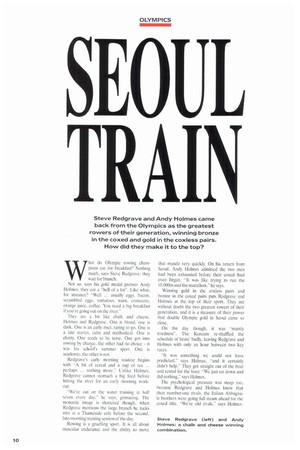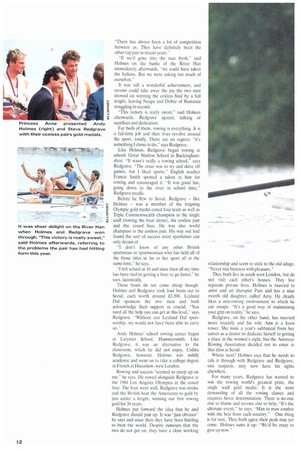SEOUL
Page 60

Page 62

If you've noticed an error in this article please click here to report it so we can fix it.
A=N
What do Olympic rowing champions eat for breakfast? Nothing much. says Steve Redgrave: they wait for brunch. Not so, says his gold medal partner Andy Holmes: they eat a "hell of a lot". Like what, for instance? "Well ... usually eggs. bacon, scrambled eggs. tomatoes, toast, croissants, orange juice. coffee. You need a big breakfast if you're going out on the river.
They are a bit like chalk and cheese. Holmes and Redgrave. One is blond, one is dark. One is an early riser, raring to go. One is a late starter, calm and methodical. One is chatty. One tends to be terse. One got into rowing by chance. the other had no choice it was his school's summer sport. One is academic, the other is not.
Redgrave's early morning routine begins with "A bit of cereal and a cup of tea ... perhaps ... nothing more." Unlike Holmes. Redgrave cannot stomach a big feed before hitting the river for an early morning workout.
"We're out on the water training at half seven every day," he says, grimacing. The monastic image is shattered though. when Redgravc mentions the large brunch he tucks into at a Thameside cafe before the second, late-morning training session of the day.
Rowing is a gruelling sport. It is all about muscular endurance and the ability to move
that muscle very quickly. On his return from Seoul, Andy Holmes admitted the two men had been exhausted before their coxed final even began. It was like trying to run the 10,000m and the marathon," he says.
Winning gold in the coxless pairs and bronze in the coxed pairs puts Redgrave and Holmes at the top of their sport. They are without doubt the two greatest rowers of their generation, and it is a measure of their power that double Olympic gold in Seoul came so close.
On the day though. it was "mainly tiredness-. The Koreans re-shuffled the schedule of heats' badly, leaving Redgrave and Holmes with only an hour between two key races.
"It was something we could not have predicted." says Holmes, "and it certainly didn't help.They got straight out of the boat and rested for the hour. "We just sat down and did nothing,says Holmes.
The psychological pressure was steep too, because Redgrave and Holmes knew that their number-one rivals. the Italian Abbagnale brothers were going full steam ahead for the coxed title. "We're old rivals," says Holmes.
-There has always been a lot of competition between us. They have definitely been the other top pair in recent years."
"If we'd gone into the race fresh," said Holmes on the banks of the River Han immediately afterwards, "we could have taken the Italians. But we were asking too much of ourselves."
It was still a wonderful achievement, and no-one could take away the joy the two men showed on winning the coxless final by a full length, leaving Neagu and Dobre of Rumania struggling in second.
-This victory is really sweet," said Holmes afterwards. Redgrave agreed, talking of sacrifices and dedication.
For both of them, rowing is everything. It is a full-time job and their lives revolve around the sport, totally. There are no regrets: "it's something I chose to do." says Redgrave.
Like Holmes. Redgrave began rowing at school: Great Marlow School in Buckinghamshire. -It wasn't really a rowing school," says Redgrave. "The craze was to try and skive off games, but I liked sports." English teacher Francis Smith spotted a talent in him for rowing and encouraged it. "It was good fun, going down to the river in school time,Redgrave recalls.
Before he flew to Seoul. Redgrave like Holmes was a member of the reigning Olympic gold medal coxed four team as well as Triple Commonwealth champion in the single scull (rowing the boat alone), the coxless pair and the coxed four. He was also world champion in the coxless pair. His way out had found the sort of success most sportsmen can only dream of.
"I don't know of any other British sportsman or sportswoman who has held all of the those titles in his or her sport all at the same time." he says.
"I left school at 16 and since then all my time has been tied to getting a boat to go faster," he says, laconically.
Those boats do not come cheap though. Holmes and Redgrave took four boats out to Seoul, each worth around £3,300. Leyland Daf sponsors the two men and both acknowledge their support as crucial. -You need all the help you can get at this level," says Redgrave. "Without our Leyland Daf sponsorship, we would not have been able to carry on."
Andy Holmes' school rowing career began at Latymer School, Hammersmith. Like Redgrave. it was an alternative to the classroom, which he did not enjoy. Unlike Redgrave, however, Holmes was mildly academic and went on to take a college degree in French at Hounslow. west London.
Rowing and success "seemed to creep up on me.he says. He rowed alongside Redgrave at the 1984 Los Angeles Olympics in the coxed four. The boat went well. Redgrave was stroke and the British beat the Americans to gold by just under a length, winning our first rowing gold for 36 years.
Holmes put forward the idea that he and Redgrave should pair up. It was -just obvious" he says and since then they have been battling to beat the world. Despite rumours that the two do not get on, they have a close working
relationship and seem to stick to the old adage, "Never mix business with pleasure."
They both live in.south west London, but do not visit each other's houses. They live separate private lives. Holmes is married to artist and art therapist Pam and has a nine month old daughter. called Amy. I-le clearly likes a non-rowing environment to which he can escape. "It's a good way of maintaining your grip on reality," he says.
Redgrave. on the other hand, has married more recently and his wife Ann is a keen rower. She took a year's sabbatical from her career as a doctor to dedicate herself to getting a place in the women's eight, but the Amateur Rowing Association decided not to enter in that class at Seoul.
Where next? Holmes says that he needs to talk it through with Redgrave and Redgrave, one suspects. may now have his sights elsewhere.
For many years, Redgrave has wanted to win the rowing world's greatest prize, the single scull gold medal. It is the most demanding of all the rowing classes and requires fierce determination. There is no-one else to blame and no-one else to help, "It's the ultimate event," he says. "Man to man combat with the best from each country." One thing is for sure. They both agree their peak may yet come. Holmes sums it up: "We'd be crazy to give up now."




















































































